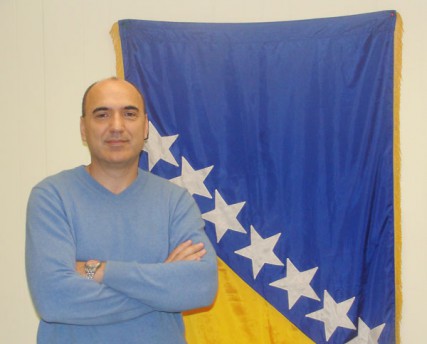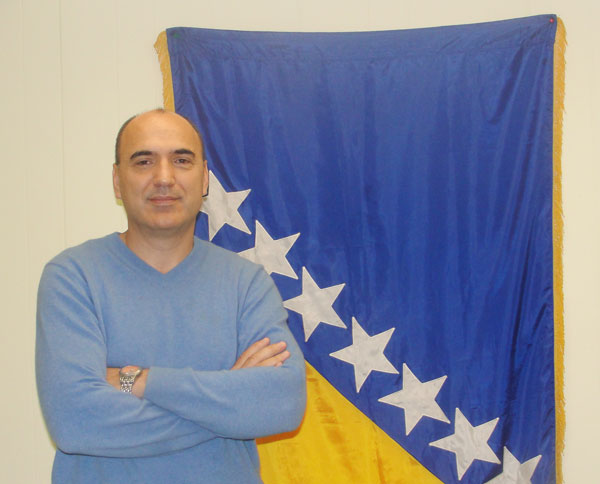BOSTON (RNS) As a young soldier in Bosnia, Azem Dervisevic led a platoon that helped keep the capital city of Sarajevo from falling to Serb forces during the 1992-1995 Bosnian war.
Now, as a civilian in the Boston area, Dervisevic is still fighting for his homeland, but with culture instead of bullets.

As a young soldier in Bosnia, Azem Dervisevic led a platoon that helped keep the capital city of Sarajevo from falling to Serb forces during the 1992-1995 Bosnian war.
In June, he helped found the New England Friends of Bosnia and Herzegovina, a group that helped organize a recent art exhibit, “Bosnian Born,” featuring the work of more than 20 Muslim, Serb and Croat artists born in Bosnia.
The group also inaugurated its first semester of Bosnian language classes, with a dozen students between 6 and 9 years old. Dervisevic hopes it will promote Bosnian culture, encourage reconciliation between Bosnia’s different ethnic groups, and preserve the history of the war that introduced the term “ethnic cleansing.”
“I lost my brother and almost all my best friends in the war. I can’t forget and I can’t let anybody else forget what happened,” said Dervisevic, who came to Boston in 1993, went to business school, and now runs a successful construction company.
Despite their relatively short time in America and the ghosts of war, Bosnian Muslims are largely well integrated and often thriving in American society. Many have become physicians, university professors, business owners and financiers. Their children, like the children of most immigrant groups, are poised to do even better.
Success, however, hasn’t diminished the sense of injustice that many Bosnian Muslims in America feel over how the war ended, concerns that their struggles could be forgotten, and worries that their culture is still being erased.
Serb forces attacked Bosnia after its government declared independence from the former Yugoslavia in 1992, and waged a campaign of “ethnic cleansing” against non-Serbs that killed close to 200,000 people, mostly Bosnian Muslim civilians, and drove another million from their homes.
Mosques, Muslim cemeteries and other cultural markers were destroyed to erase evidence of Bosnian Muslim life. Some Croatian groups also committed ethnic cleansing. The atrocities were documented by war crimes reporters from the U.S. and other governments, nongovernmental organizations, and the United Nations, which established an international war crimes tribunal in The Hague.
After bedeviling most of Bill Clinton’s first term, the war ended with the U.S.-brokered Dayton Peace Agreement, which split the country into two states, one Serb and one composed of Bosnian Muslims and Croats.
Although relieved the fighting was over, many Bosnians felt the Dayton agreement rewarded the Serbs’ wartime leaders for their war crimes. That feeling has since been compounded by Bosnians' suspicions that Serb nationalists are trying to suffocate Bosnia with political gridlock, economic stagnation, blocking the return of refugees, and erasing evidence of Bosnian culture.
“Bosnia paid a huge price, and we didn’t achieve anything,” said Alma Vilogorac, a refugee from Sarajevo who now lives in San Francisco. “In Bosnia, genocide is rewarded.”
Vilogorac, who lost two brothers in the war, is one of 13 Bosnians who in 1997 sued Radovan Karadzic, the self-styled Bosnian Serb president who's now on trial in The Hague for crimes against humanity. The judge awarded the plaintiffs $4.6 billion, although they have not been able to recover it.
Despite the reams of evidence preserved by governments and international institutions, many Bosnians feel that Serb nationalists and those who failed to stop the atrocities — including top U.N. and Western officials — want to deny or downplay the war crimes.
“So many people have a stake in denying what happened in Bosnia,” said Benjamin Moore, a professor at Fontbonne University in St. Louis, where he helped create “The Bosnia Memory Project,” a collection of interviews, documents and other materials “dedicated to establishing an enduring record of Bosnian genocide survivors.”
“The acknowledgment for the genocide won’t come from the top. Change has to come from the people,” said Moore.
Leaders from the Republika Srpska, as the Serb entity in Bosnia is known, repeatedly deny claims of ethnic cleansing and hail convicted war criminals as heroes. Bosnian Serb authorities routinely threaten to secede, and have established their own police force, telecom system, school system, and other institutions.
Most Bosnian Muslim refugees have not been able to return to their homes in the Serb republic, where streets and points of interest once named for famous Bosnians have been renamed after famous Serbs.
Bosnian Muslims say they have reconciled with Serbs who are willing to acknowledge what happened during the war, but say that it is much harder to reconcile with Serb nationalists who deny the war crimes.
“That makes reconciliation difficult. I don’t want revenge. I’m for justice,” said Dervisevic, who sent his U.S.-born daughters to a Serbian Orthodox church to learn Bosnian, and notes that his group, including the board of directors, has many Serbs.
Amir Karadzic, who is from Prijedor, one of the first Bosnian cities to face ethnic cleansing, agreed.
“Reconciliation is all about truth. Today in the Serbian part of Bosnia, you only have denial of genocide,” said Karadzic, who lives in St. Louis and worked with Moore. “I want to preserve history so history can be a tool to stop war before war even begins. Only honest relations can bring two people together.”
The war also made him more aware of his religion, he said.
“I cannot say that I’m a big Muslim, that I’m praying every day. But I’m teaching my son and everyone around me that you have to keep your faith,” Amir Karadzic said. “If you don’t have that, nobody’s going to recognize you; you’re not going to have a face.”
While Bosnian immigrants are not sure if they will live to see their former homeland thrive, many are confident that their children will also demand that their parents’ and grandparents’ suffering won’t be forgotten.
“Going to school, they have to identify with their origins, they see how other people respect their original country,” said Vilogorac. “I believe in new generation.”
(This story was made possible in part by a fellowship from the French-American Foundation—United States as part of the Immigration Journalism Fellowship.)
KRE/AMB END SACIRBEY





